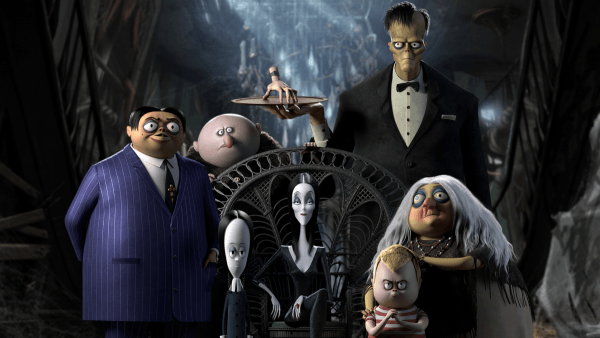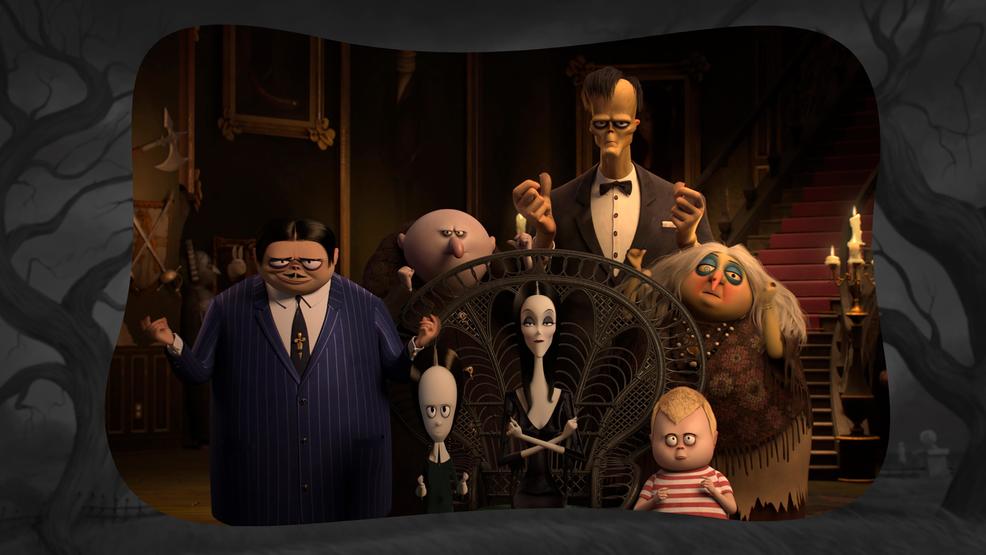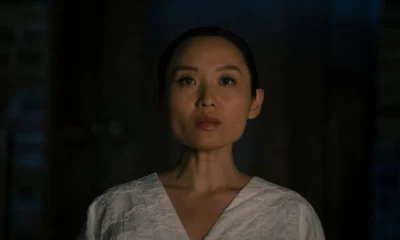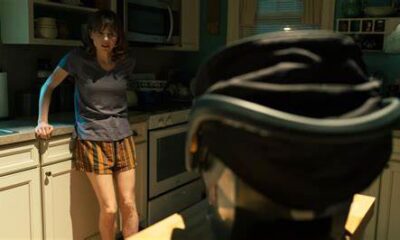
Review: The Addams Family (2019)
The Addams Family is one of those franchises that has different eras that have their die-hard supporters. Fans of the original TV show generally are not the sort who are highly passionate about the original Charles Addams comics. Nor are the fans of the 1990s films super involved with singing the praises of the original show. That’s not to say that this doesn’t happen. It is just that there are different Addams-eras, and they have their principal audience.
Now we enter a new era with 2019’s animated adaptation of The Addams Family. The question that must be asked is whether this take on the family will inspire any similar passions.
They’re creepy and they’re kooky…
We all know The Addams Family and know the ear-worm theme song. We know the basic archetypes. When you go to see a reboot of The Addams Family you already know what to expect. The film follows the origins and the travails of the Addams Family, a group of strange individuals assembled on a haunted house on a hill. The family’s patriarch, Gomez Addams (Oscar Isaac), and the matriarch, Morticia (Charlize Theron), raise their two children Wednesday (Chloë Grace Moretz) and Pugsley (Finn Wolfhard). They are often accompanied by Gomez’s mother, Grandmama (Bette Midler), and his brother, Fester (Nick Kroll). The family also lives with Thing, a severed, sentient hand, and the live-in help, Lurch (Conrad Vernon).
But hey, you know all this.
What you do not know is that movie follows the family as they discover a planned community has sprung up virtually overnight in the valley below. The Addamses are understandably concerned, having been run out of “the old country.” The question remains, however, whether history will repeat itself when they come into the cross hairs of reality TV host Margaux Needler who is banking on the planned community of “Assimilation” to be her greatest triumph. Throw in a dueling subplot about a father understanding his son, and mothers dealing with rebellious daughters, and you have yourself a 2019 Addams Family movie.
The film also features the voices of Snoop Dogg, Allison Janney, and Titus Burgess. There is also a rather fun cameo featuring Catherine O’Hara and Martin Short.
The movie was directed by the pairing of Conrad Vernon and Greg Tierman. Matt Lieberman, Erica Rivinoja, and Conrad Vernon wrote The Addams Family, adapting it from the original comics by Charles Addams, but with plenty of references to the television show as well.
What worked with The Addams Family?

The film isn’t a bad movie. It’s not great, but it is an effective distraction for a little over an hour. For anyone who has grown up with some form of The Addams Family there are nods and continuations of what you’d expect to see in an Addams Family movie, but little else. The story is fairly cloying, even for children, but the idea of taking the story back to Gomez and Morticia’s wedding was a welcome surprise. It established the central conflict of otherness fairly well. It is just a shame that what should be a whip-smart parody of a nuclear family ends up wrapping up with a fairly standard 3rd act action-conflict than anything truly clever.
The brightest spot of the film is the willingness to crib the character designs directly from Charles Addams’ original comics, but the CGI feels fairly texture-less and many of the designs skew just a little too far from the source. Overall though, the willingness to play closer to the original source of the characters is a good impulse and definitely makes the Addamses stand out among computer-animated family fare. The film is not afraid to be ugly and weird.
What didn’t work?
So many elements of the movie smack of a sort of template. The character designs are largely pretty boring outside of the family themselves. Also, there are so many odd choices made that reflect a mid-2000s animated aesthetic and storytelling impulse. Take, for example, celebrity stunt-casting. None of the actors who landed a role in the film really deliver much. I feel we’d have been far better off as viewers with Oscar Isaac as a live-action Gomez rather than delivering a fairly average voice-over role. Even the core cast’s most accomplished voice actor, Nick Kroll, does not really add anything to the film with his take on Fester. It’s the same sort of voices he’s used somewhere in Big Mouth.
Maybe the biggest example of this mid-2000s casting impulse is having Snoop Dogg voice Cousin It. You don’t get to hear Snoop, really, just the sped-up-gibberish of It. The thing is, you could have easily had anyone else do that part. Instead, it went to Snoop, and it was mostly for a gag; Cousin It drives up to the Addams’ mansion blaring “Drop It Like It’s Hot.”
Look, this is not a bad film. It’s just uninspired. While watching it I didn’t think “this was terrible.” But I did feel like there were a lot of lazy choices. It suffers from that same sort of latter-day-Shrek style of a basic story with gags for kids and pop-culture references for the adults. I am not going to be upset at such a paper-thing plot being predictable. I do, however, find myself annoyed the film did not do more to grapple with the more subversive nature of previous Addams Family adaptations.
Final Impressions

The Addams Family is cute but fleeting. If you miss it in theaters you will not be missing much. It’d be worth a catch on Netflix or whatever inevitable streaming service it lands on. It’s a curiosity, but I highly doubt it will inspire a passionate fanbase.
 (2 / 5)
(2 / 5)
How did you feel about The Addams Family? Want to see what we thought of other horror movies? Why not check out our reviews?
Movies n TV
Wheel of Time A Question of Crimson Is a Political Espionage Delight
Episode two of Wheel of Time felt like the beginning of a long journey. Stories are unfolding, lives are changing, and blood is spilling.
Let’s discuss.
The story
We begin this episode in the past with Elayne’s mother, Queen Morgase. It turns out her rise to the throne was a bit, shall we say, cutthroat. So when she shows up at the White Tower, Siuan is concerned.
She might have reason to be, too.
Meanwhile, Rand, Egwene, Moiraine, Lan and Aviendha are in the Spine of The World. As they travel through some of the most breathtaking lands I have ever seen on a TV show, Egwene is plagued with nightmares. We think at first that’s just her trauma working itself through her system. But we soon find out that it might not be that straightforward.
Finally, Perrin returns home to heal after his hand is almost cut in half. But when he gets there he finds the town has been infested by Children of The Light. And they’re looking for him.
What worked
There was something heartwarming in this episode about political espionage and choking religious persecution. And that is Elayne’s relationship with her family.
I have consumed a lot of fantasy content with royal families. And I have never once heard a princess call her mother ‘Mum’. I’ve never seen royal siblings get along. And I have sure as hell never seen a princess have a good relationship with her step-parent.
This was refreshing. Even though Queen Morgase is kind of a horrible person she seems like a good mother. And that’s an unexpected delight.

Of course, this is just one storyline among many. And while this can sometimes be overwhelming, in this case it wasn’t.
I’ll be honest, some of these storylines are going to drag for me. I know this because I’ve read some of the Wheel of Time books and I have an idea that not all the characters exactly pique my interest.
No one likes all the characters. No one likes all the storylines. While I am here for the political espionage between Queen Morgase and Siuan, not everyone likes it. While others might be fascinated with Selene trying to win Rand back, I couldn’t care less.
Having multiple storylines keeps everyone’s attention better. So long as things don’t get out of hand. Things can easily get out of hand. But this seems to be managed well.
So far.
What didn’t work
As I mentioned above, I’m not thrilled with Rand’s story at this point. And while it’s fine to not like a storyline when there are this many to choose from, it’s not fantastic that the one I like the least is the one involving our two main characters. And anytime we were with the team at the Spine of The World, the only thing that brought me joy was Moirain’s hat. It reminded me of Stockard Channing’s hat in Practical Magic.
The problem is that Rand is Charlie Brown with controversial magical powers. He is boring, serious, and pessimistic.
And yes, I understand that he has a heavy emotional burden and he’s the Dragon Reborn and that’s quite taxing and all. But let’s be fair, there isn’t a single person in this show that doesn’t have a heavy burden. And most of them manage to be fun occasionally.

All that being said, this episode of Wheel of Time did exactly what it needed to do. It set up conflicts at each of the three locations. It established emotional ties between the characters and the events. And it established goals for everyone.
This was, in short, a solid episode. Not groundbreaking, not mind-blowing or life changing. It was simply good. It was entertaining and moved the plot forward.
Well done.
 (3.5 / 5)
(3.5 / 5)
Movies n TV
Wheel of Time Returns With A Bang
Wheel of Time is back for season three. There are mixed feelings regarding this. Last season, there were some serious pacing issues. And some serious sticking to the book’s storyline issues. But we’re two seasons in, and we don’t give up so easily. So let’s dive into episode one, To Race the Shadow.
By the way, I highly recommend watching this episode with the subtitles on. You’ll see why.
The story
We begin this episode with Liandrin facing a trial of sorts for her rampant betrayal. She does her best to gaslight her Aes Sedai sisters into thinking that Siuan Sanche is the real traitor.

When that doesn’t work, she reveals how many Black Aes Sedai have actually infiltrated the tower.
Spoiler, it’s a lot.
In the aftermath, our whole team gathers to drink and enjoy one night of relaxation before they head out to the Tear to form an army for Rand. All is going well until they’re attacked by myriad creatures and a sentient axe.
What worked
This episode was long. It had a run time of an hour and eleven minutes. And a lot of that run time was spent in heavy dialog scenes.
Fortunately, these were well-done scenes.
If you’re going to have a lot of talking scenes, there are good ways and bad ways to do it. Last season, we saw lots of examples of the bad way to do it. But this episode did it well. For one thing, other things were going on while conversations were taking place. The characters are drinking, playing games, walking through an interesting city. And the scenes themselves didn’t stretch out. They weren’t repetitive. We heard what the character had to say, then we moved on.
It was also nice that the point of these scenes wasn’t just info dumps. We had character development. We had romantic interactions. We had plot development and foreshadowing.
Overall, this episode felt like what it was. A moment of calm before a storm.
Taking a step back, I’d be remiss if I didn’t address the fight scene at the start of the episode. Because it was epic.
The magic looked amazing. The martial arts that went along with it looked fantastic. The costumes were beautiful. It was just incredibly fun to watch.
More than that, it was emotional. We lost some characters in that fight that were important. And it was clearly emotionally shattering for many of our characters, who found themselves betrayed by people they trusted.
So many of them.
It was a great way to open the season.
What didn’t work
Despite that, this episode wasn’t without its flaws.
First off, there were a lot of dialog scenes. And they were good scenes, as I’ve already discussed. But it was one after another after another. And when your episode is, again, an hour and eleven minutes, it’s maybe a little much to have so much chit-chat. Couldn’t some of these conversations, important as they were, have been moved to maybe another episode?
Finally, I want to talk about Egwene’s travel through the arches.

I feel like maybe there were some deleted scenes here. Because there must have been more to that visit than what we saw, right?
We could have seen Egwene battle Rand. That would have been badass and emotionally devastating. We could have seen her with a quiet life with Rand back home at the Two Rivers. We could have seen anything except for the quick clip of Rand in a bloody river, followed by Egwene being shoved back out in a bloody shift.
Bad job. But at least it wasn’t an extended scene of Moiraine collecting bathwater, and then taking a bath while looking sad. If we’d started this season with another scene like that, it might have broken my brain.
Amazon dropped the first three episodes at once. So we’ll be back soon to talk about episode two. See you then.
 (4 / 5)
(4 / 5)
Movies n TV
Entertaining as hell: Eight Legged Freaks (2002) Review
Early 2000s is a special era for the industry. It accepts the cheesiness and corniness of movie making, in turn producing some gems in their own right. Eight Legged Freaks starring David Arquette and young Scarlet Johanson is a horror comedy about giant spiders who overtake a small town. As crazy as that premise sounds, the movie surprisingly has a ton of heart and is super entertaining. Let’s review, shall we?
Plot
We start Eight Legged Freaks with a shot of toxic waste spilling into the water supply of Joshua, a spider farm owner. He is friends with Mike, one of our protagonists, who is a science geek and a spider enthusiast. Mike notices something quite right upon visiting Joshua, but no one takes him seriously. We are then introduced to the rest of the crew. Mike’s mother Samantha, the town sheriff, is too busy chasing Ashley, his sister, who is dating the town mayor’s son Bret (something Samantha does not approve of). We also have Chris, who returns to the town to save his father’s legacy in the town mines. He has opposition from Wade, Bret’s father, who wants to use the mines for his business ventures. Lots of drama going on that will only get juicier once the spiders get loose.
The creepy crawlies quickly dispose of Joshua and make their grand appearance after Ashley rejects Bret’s advances, abandoning him in the middle of a desert. A glorious chase sequence ensues as the spiders make their way towards the town, wreaking havoc on its residents. In a true horror fashion (which the movie acknowledges), it takes some convincing from Mike and then from Samantha for the town to take the threat seriously. The tongue-in-cheek style of narrative adds the comedy aspect to a movie that would otherwise burn out fairly quickly.
The remaining characters hide out in a shopping mall as it’s the only somewhat sturdy building in the area. This doesn’t last long as the spiders break in, forcing them to run through the mines. Their resources to fight the creepy crawlies off are limited as the methane gas doesn’t allow them to use firearms. Such conditions require resourceful thinking from Chris, who uses perfume to fend off the leader of the spider group and save himself during the climax of the movie.
Character dynamics are not forgotten once the action kicks in. We have Chris confessing his long-term feelings for Samantha which she knew all along, which provided some comedic relief. Bret also reunites with Ashley and apologises for being an asshole. Mike finally gets the appreciation he deserves as his knowledge saves the townsfolk more than once during the whole ordeal.
We end the movie with the town’s radio show person telling the story as an urban legend during his segment. This brings it into question – how much of it happened the way he said it did? We can only guess…
Overall thoughts
Eight Legged Freaks is a fun creature feature with some self-aware commentary on genre tropes that doesn’t take itself too seriously. The acting is good, the pacing fitting and the characters are likeable enough for you to want them to make it through. Definitely a must watch, if you don’t suffer from arachnophobia, that is.
 (5 / 5)
(5 / 5)













